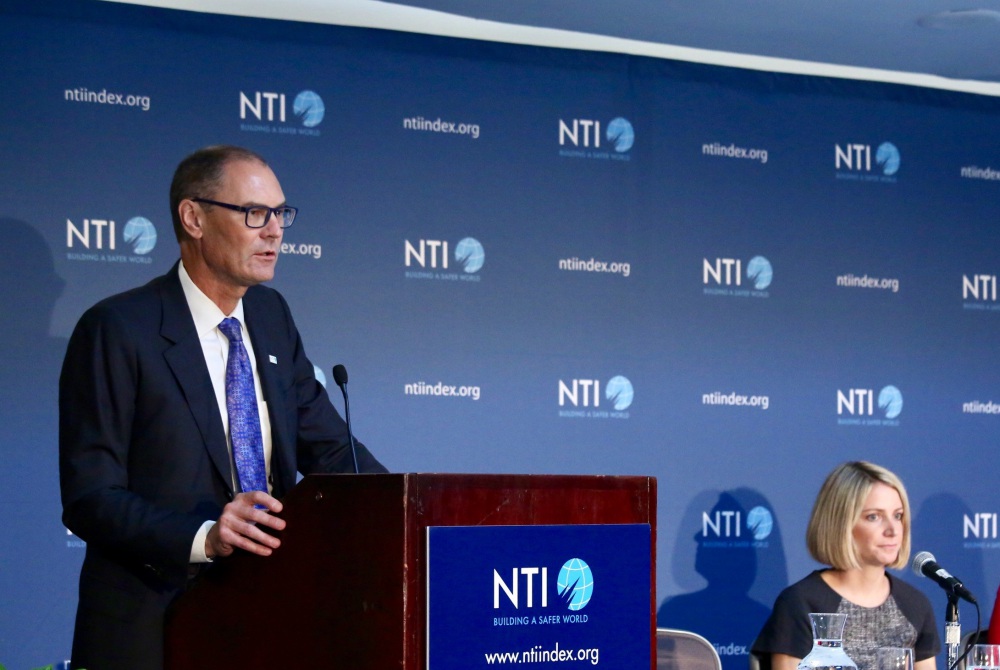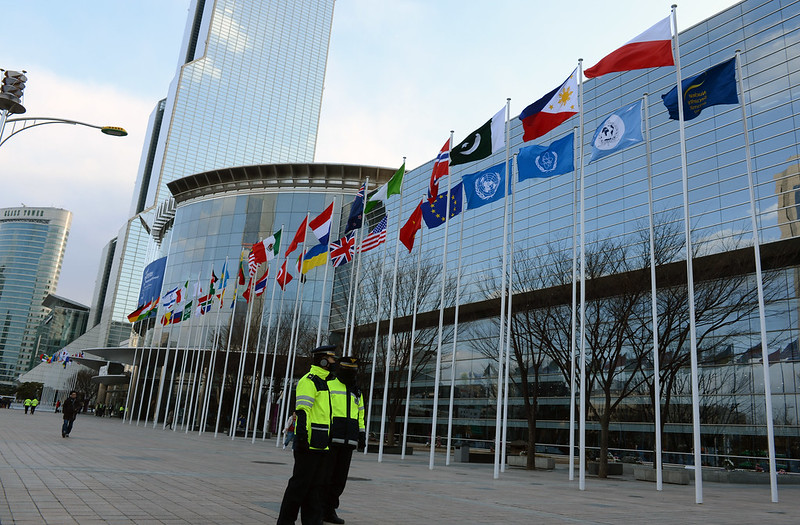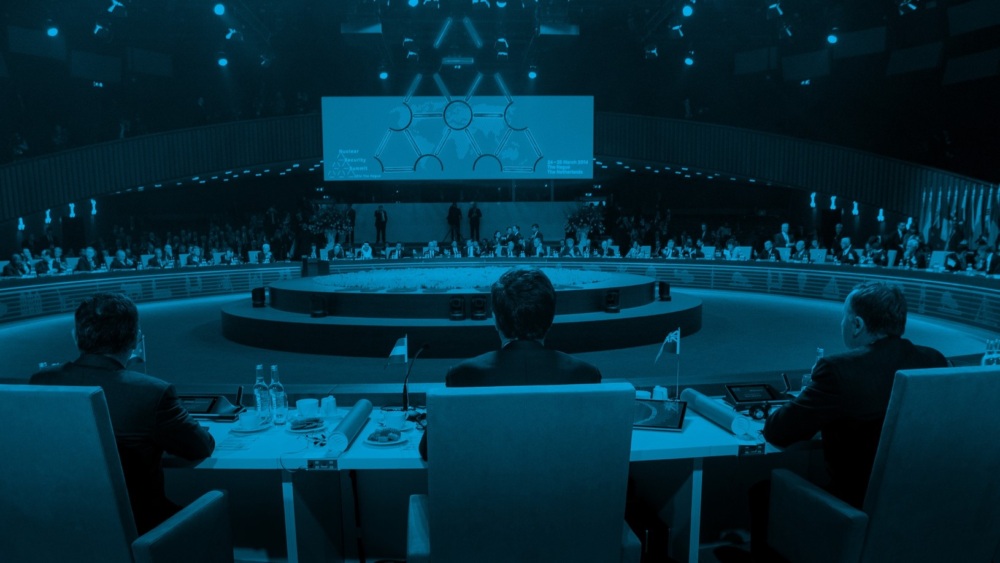Countries Poorly Prepared to Defend Against
Evolving Cyber Threats
WASHINGTON, DC—After years of progress on nuclear security, the
fourth edition of the NTI Nuclear Security Index finds that the steps countries
have taken to reduce the threat of catastrophic nuclear terrorism are jeopardized
by a deterioration of political stability and governance, an increase in
corruption, and the expanding presence of terrorist groups around the world. The
2018 NTI Index also finds that many countries remain poorly prepared to defend
against rapidly expanding and evolving cyber threats to nuclear facilities.
At the same time, the biennial NTI Index finds that despite these
growing risks, progress to secure, minimize, and eliminate the world’s
deadliest materials—as well as to ensure the security of nuclear facilities—has
accelerated since 2016. Today, 22 countries have weapons-usable nuclear materials,
compared with 32 when the first NTI Index was released in 2012. In the past two
years, Argentina and Poland have joined the list of countries that have removed
or disposed of all highly enriched uranium within their territories.
In another positive development, of the 44 countries and Taiwan that
have nuclear facilities where an act of sabotage could cause a dangerous
release of radiation, 78 percent improved their Sabotage Ranking scores by
implementing greater on-site physical protection, enhanced insider threat
prevention, improved response capabilities, and other security measures.
However, the NTI Index, which is produced with the Economist Intelligence Unit
(EIU) and serves as a critical resource and tool for assessing global nuclear
security, shows substantial room for improvement in this area and finds a
troubling deterioration in the risk environment in a quarter of the countries
with nuclear materials or facilities that could be targeted.
“It is clear that governments struggle to stay ahead of—even to keep
pace with—evolving and escalating threats, so it is more important than ever
that countries stay focused on improving security within their own borders and
on developing an effective global security system to protect the world’s
deadliest materials,” said NTI C0-Chair and CEO Ernest J. Moniz. “The good news
is that progress on security has accelerated in 2016; the bad news is that much
of that progress is now at risk.”
Driving progress in recent years: the four global Nuclear Security
Summits, held between 2010 and 2016, which elevated the importance of nuclear
security to the head-of-state level, sharpened understanding of the steps
needed to prevent catastrophic terrorism, and prompted countries to make
commitments to improve the security around potentially vulnerable nuclear
materials and facilities.
“The summits were crucial for holding states accountable for appropriate
and effective security measures,” said NTI President Joan Rohlfing.
“Unfortunately, no comparable cooperative global effort has emerged to replace
them, leaving dangerous gaps in the current global nuclear security system that
terrorist groups or others seeking weapons of mass destruction could exploit.”
Country
Highlights
In the Theft Ranking:
- As in 2012, 2014, and 2016, Australia is number one among the 22 countries with weapons-usable nuclear materials—but this time it shares the top spot with Switzerland.
- Japan improved its score more than any other country since 2012 by decreasing its quantities of nuclear materials and improving insider threat-prevention measures, as well as physical and cybersecurity regulations.
- China, Belgium, and Germany made notable improvements to their scores by taking important steps in areas such as insider threat prevention, cybersecurity, and physical security during transport and at facilities.
- Finland, New Zealand, and Sweden tied for the top ranking among countries with less than one kilogram of or no weapons-usable nuclear materials.
In the Sabotage Ranking:
- Finland
ranks number one for the second time among countries with nuclear facilities,
such as power plants or research reactors, in need of protection against
sabotage.
- As in 2016, Australia, Canada, Japan, and the United Kingdom round out the top five.
Full data, country profiles, and a new score simulator are available
at www.ntiindex.org.
Recommendations
The NTI Index offers recommendations for individual countries and
for the international community as a whole to improve security and to keep
attention focused on the threat of nuclear terrorism. The NTI Index recommends
that states and the international community should:
- Build
an effective global nuclear security system grounded
in common international standards, a mechanism for holding states
accountable, and a comprehensive international legal foundation. The
system should cover all weapons-usable materials including materials
classified as “military materials,” and countries should address critical
security gaps by bolstering the international legal foundation for nuclear
security; taking steps to build international confidence in the
effectiveness of their security; and strengthening the International
Atomic Energy Agency’s role and capacity for nuclear security risk
management.
- Defend
against the growing risk of cyberattack by promoting and
investing in continuous improvement of cybersecurity measures at all
nuclear facilities; building mutual assistance mechanisms and shared
resources for responding to cyberattacks; and increasing the quality and
quantity of cyber-nuclear experts.
- Improve
state stewardship of nuclear materials and facilities by committing to minimize their use and further
decrease stocks of weapons-usable nuclear materials; improve core security
and control measures such as on-site physical protection and material
control and accounting procedures; and reduce political risks that can
undermine nuclear security by exacerbating terrorist threats.
International Participation
NTI
and the EIU drew on the expertise of an International Panel of Experts from
nuclear and non-nuclear weapons states. Governments from the 46 countries and
Taiwan included in the theft ranking for countries with materials, the sabotage
ranking, or both were offered opportunities to review the NTI Index data, and
26 took advantage of the opportunity.
About the Nuclear Threat Initiative
The Nuclear Threat Initiative works to
protect our lives, environment, and quality of life now and for future
generations. We work to prevent catastrophic attacks with weapons of mass
destruction and disruption (WMDD)—nuclear, biological, radiological, chemical,
and cyber. Founded in 2001 by former U.S. Senator Sam Nunn and philanthropist
Ted Turner who continue to serve as co-chairs, NTI is guided by a prestigious,
international board of directors. Ernest J. Moniz serves as co-chair and chief
executive officer, and Joan Rohlfing serves as president.
##





